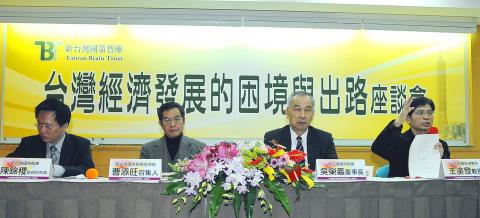Taiwan Brain Trust yesterday said it would not oppose the Economic Cooperation Framework Agreement (ECFA) as long as Beijing did not prevent Taiwan from signing free-trade agreements (FTA) with other major trading partners. However, it criticized the government’s economic policy — and its reliance on China — as flawed and misguided.
The trust’s chairman, former vice premier Wu Rong-i (吳榮義), said China represented about 70 percent of the nation’s total overseas investment, while 42 percent of Taiwan’s exports went to China and Hong Kong, making Taiwan economically vulnerable via-a-vis China.
“We must rethink our global economic strategy. In particular, we must strengthen the cooperative relationship with advanced countries,” he told a conference on ways to address Taiwan’s economic development dilemma.

PHOTO: WANG YI-SUNG, TAIPEI TIMES
Wu said the administration’s had three myths about economic policy: it thought China was the only option for repairing Taiwan’s economy; it thought economic growth was everything and failed to realize that economic growth did not necessarily improve the quality of life or narrow the wealth gap; and it thought big businesses deserved preferential tax cuts, while ignoring the economically disadvantaged, small and medium-sized businesses and residents of central and southern Taiwan, where resources were inadequate compared with what is allocated to the north.
Wu said the administration should increase its cooperation with developed countries, emphasize creating jobs rather than economic growth, improve the investment environment, restructure finances and reform the tax system, allocate national resources more reasonably and commit to sustainable development.
“The purpose of a government’s existence is to let its people live a good life,” he said. “Being happy is not only about making more money or [achieving] higher economic growth. It is also about guaranteeing their jobs, quality of life, physical and mental health, confidence and dignity, social harmony and national security.”
Chen Jinji (陳錦稷), a research fellow at the trust, said the administration’s economic policy was seriously mistaken because of the three myths mentioned by Wu.
“The government’s economic policy not only fails to solve problems, it makes things worse,” he said. “When a government gets the problem wrong and prescribes the wrong medicine, the result is a government that is ineffectual.”
Tsaur Tien-wang (曹添旺), convener of the trust’s economics department, said he was concerned about the ECFA’s negative impact, saying that when a smaller economy integrates with a bigger one, it is easier for the smaller one to become marginalized in terms of employment, investment and income.
The only way out is for the smaller economy to develop economic ties with other countries and sign FTAs, he said.
This applies to Taiwan, he said, -adding that Taiwan’s future would be -limited if China continues to block its efforts to sign FTAs with Taiwan’s major economic partners.

Alain Robert, known as the "French Spider-Man," praised Alex Honnold as exceptionally well-prepared after the US climber completed a free solo ascent of Taipei 101 yesterday. Robert said Honnold's ascent of the 508m-tall skyscraper in just more than one-and-a-half hours without using safety ropes or equipment was a remarkable achievement. "This is my life," he said in an interview conducted in French, adding that he liked the feeling of being "on the edge of danger." The 63-year-old Frenchman climbed Taipei 101 using ropes in December 2004, taking about four hours to reach the top. On a one-to-10 scale of difficulty, Robert said Taipei 101

Nipah virus infection is to be officially listed as a category 5 notifiable infectious disease in Taiwan in March, while clinical treatment guidelines are being formulated, the Centers for Disease Control (CDC) said yesterday. With Nipah infections being reported in other countries and considering its relatively high fatality rate, the centers on Jan. 16 announced that it would be listed as a notifiable infectious disease to bolster the nation’s systematic early warning system and increase public awareness, the CDC said. Bangladesh reported four fatal cases last year in separate districts, with three linked to raw date palm sap consumption, CDC Epidemic Intelligence

Two Taiwanese prosecutors were questioned by Chinese security personnel at their hotel during a trip to China’s Henan Province this month, the Mainland Affairs Council (MAC) said yesterday. The officers had personal information on the prosecutors, including “when they were assigned to their posts, their work locations and job titles,” MAC Deputy Minister and spokesman Liang Wen-chieh (梁文傑) said. On top of asking about their agencies and positions, the officers also questioned the prosecutors about the Cross-Strait Joint Crime-Fighting and Judicial Mutual Assistance Agreement, a pact that serves as the framework for Taiwan-China cooperation on combating crime and providing judicial assistance, Liang

US climber Alex Honnold left Taiwan this morning a day after completing a free-solo ascent of Taipei 101, a feat that drew cheers from onlookers and gained widespread international attention. Honnold yesterday scaled the 101-story skyscraper without a rope or safety harness. The climb — the highest urban free-solo ascent ever attempted — took just more than 90 minutes and was streamed live on Netflix. It was covered by major international news outlets including CNN, the New York Times, the Guardian and the Wall Street Journal. As Honnold prepared to leave Taiwan today, he attracted a crowd when he and his wife, Sanni,